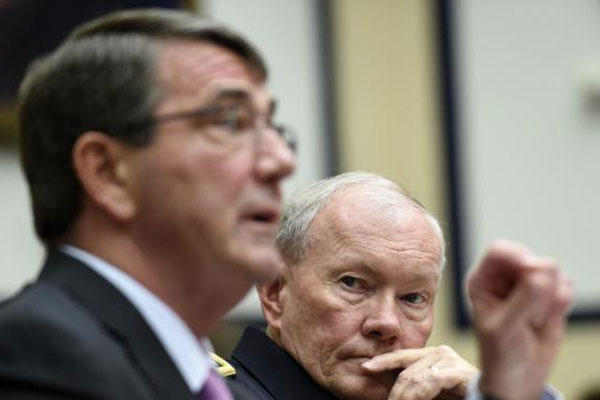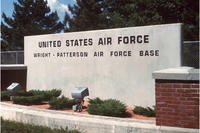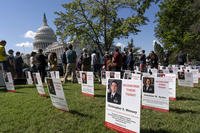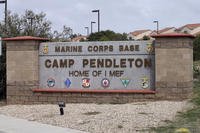Defense Secretary Ashton Carter insisted to a doubting Congress Wednesday that the U.S. has a detailed strategy for Iraq and Syria despite charges from both sides of the aisle that the Obama administration lacked an overall plan which was producing results.
At the same House Armed Services Committee hearing, Joint Chiefs Chairman Gen. Martin Dempsey defended his "lily pad" concept of forward bases in Anbar province but also appeared at one point to question the administration's commitment.
In response to questions from Rep. Mike Coffman, R-Colo., who served as a Marine in the first Gulf war, Dempsey said "I don't know what the administration's position is long term," but he later backtracked on his remark. Dempsey said he meant that he has yet to present future military options for President Obama to evaluate.
Dempsey and Carter outlined a nine-point strategy to defeat the Islamic State of Iraq and Syria (ISIS) and promote order throughout the Mideast while protecting the U.S. homeland, but they were repeatedly challenged on whether there actually was a strategy and, if so, whether it was effective.
Rep. Mac Thornberry, R-Tex., the HASC chairman, noted that the administration's plan was based on the elusive goal of establishing a non-sectarian government in Baghdad. "Hope is not a strategy," Thornberry said. "There is a sense that we are at a particularly perilous time and that U.S. policy and strategy are inadequate," he said.
After questioning whether the Sunni tribes would join the fight against ISIS, Rep. Beto O'Rourke, D-Tex., said "I hope there's a 'Plan B' for the administration."
Carter said the "Iraq first" strategy called for building up the Iraqi Security Force (ISF) to avoid putting U.S. troops at risk, but he acknowledged that the plan for training and equipping new ISF recruits was falling far short of its original goal to have 24,000 recruits ready by this fall.
Thus far, only 7,000 recruits have gone through the six-week training course at four sites – al-Asad in western Anbar province, Taji north of Baghdad, Besmaya south of Baghdad and in Irbil, capital of the Kurdish region, Carter said. An additional 2,000 Iraqis have been trained in counter-terrorism methods at a separate site near Baghdad, Carter said.
"Our training efforts in Iraq have thus far been slowed by a lack of trainees. We simply haven't received enough recruits," Carter said.
For several weeks, about 300 Marine trainers at al-Asad were essentially idle for lack of recruits to train, but on Tuesday Army Col. Steve Warren, a Pentagon spokesman, said 170 recruits had recently shown up at al-Asad.
The success or failure of the program to have local forces drive ISIS from Iraq "hinges on Sunni fighters coming into the ISF," Carter said. "The whole point of Taqaddum is to close that gap."
He referred to the 450 additional U.S. troops that the Pentagon said last week would be sent to Iraq to bring the total number of U.S. troops in the country to about 3,550.
The 450 troops would work in eastern Anbar province out of the Iraqi military base at Taqaddum, which is situated between the ISIS strongholds of Fallujah and Ramadi.
The Pentagon said those troops would not be serving as trainers but would instead focus on establishing contacts with the Sunni tribes and on advising and assisting the ISF in retaking Ramadi, which fell to ISIS last month as the ISF fled.
Last week, Dempsey told reporters traveling with him in the Mideast that he envisioned Taqaddum as the first in a series of "lily pads" that would bolster the Iraqi forces as they eventually moved northward to retake Mosul.
At the HASC hearing, Dempsey said "I used the lily pad example" to illustrate a concept of establishing a series strong points to rally local support and gain control over territory.
Dempsey said that in nature lily pads "are not free floating," but "are tethered to a network of vegetation underneath."
The deployment of the 450 troops to Taqaddum "was not a knee-jerk reaction to the fall of Ramadi," Dempsey said. "We've been planning this for months."
While admitting to the shortcomings of the Iraqi training program, Carter and Dempsey said that the plan to train up to 5,000 "moderate" Syrian rebels to battle ISIS in Syria faced even more obstacles.
Rep. Tammy Duckworth, D-Ill., who was severely wounded as an Army helicopter pilot in Iraq, said "I have real reservations" about the training" of the Syrian fighters, which is being set up by Maj. Gen. Michael Nagata of U.S. Central Command.
"Gen. Nagata is trying very hard to identify those people" who would be committed to on, Carter said. "For now, we don't have enough trainees" in the Syrian program, Carter said.
Duckworth asked "is it worth it to continue?" Dempsey replied that "it's too early to give up on it."
The bottom line for Carter and Dempsey was keeping U.S. troops off the front lines and concentrated on assisting local forces to combat ISIS. "Our role is to be an enabler" through training, advising and assisting, Carter said.
Rep. Adam Smith, D-Wash, the ranking Democrat on the Committee, said "We can drop 200,000 U.S. troops in the middle of this. It won't solve the problem."
Dempsey agreed, saying that U.S. ground troops could quickly push ISIS out of Iraq without leading to a permanent solution. "We'll be back there two years from now," Dempsey said.
Carter, who questioned the Iraqis' "will to fight" after the fall of Ramadi, said the basic requirement in Iraq was for "capable, motivated, legitimate local ground troops to seize, clear and hold" territory.
"As I've told Iraqi leaders, while the United States is open to supporting Iraq more than we already are, we must see a greater commitment from all parts of the Iraqi government," Carter said.
-- Richard Sisk can be reached at richard.sisk@military.com





























